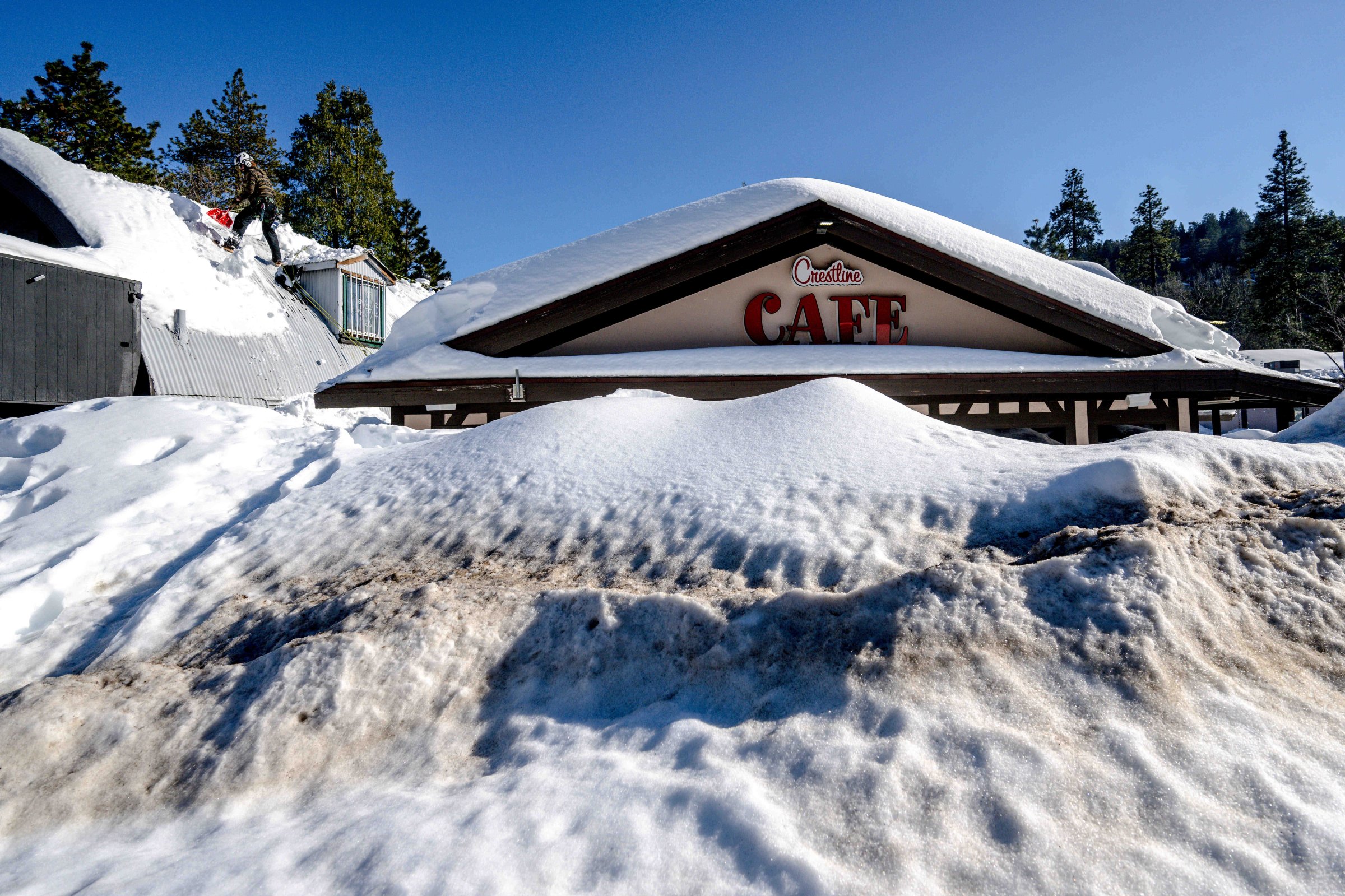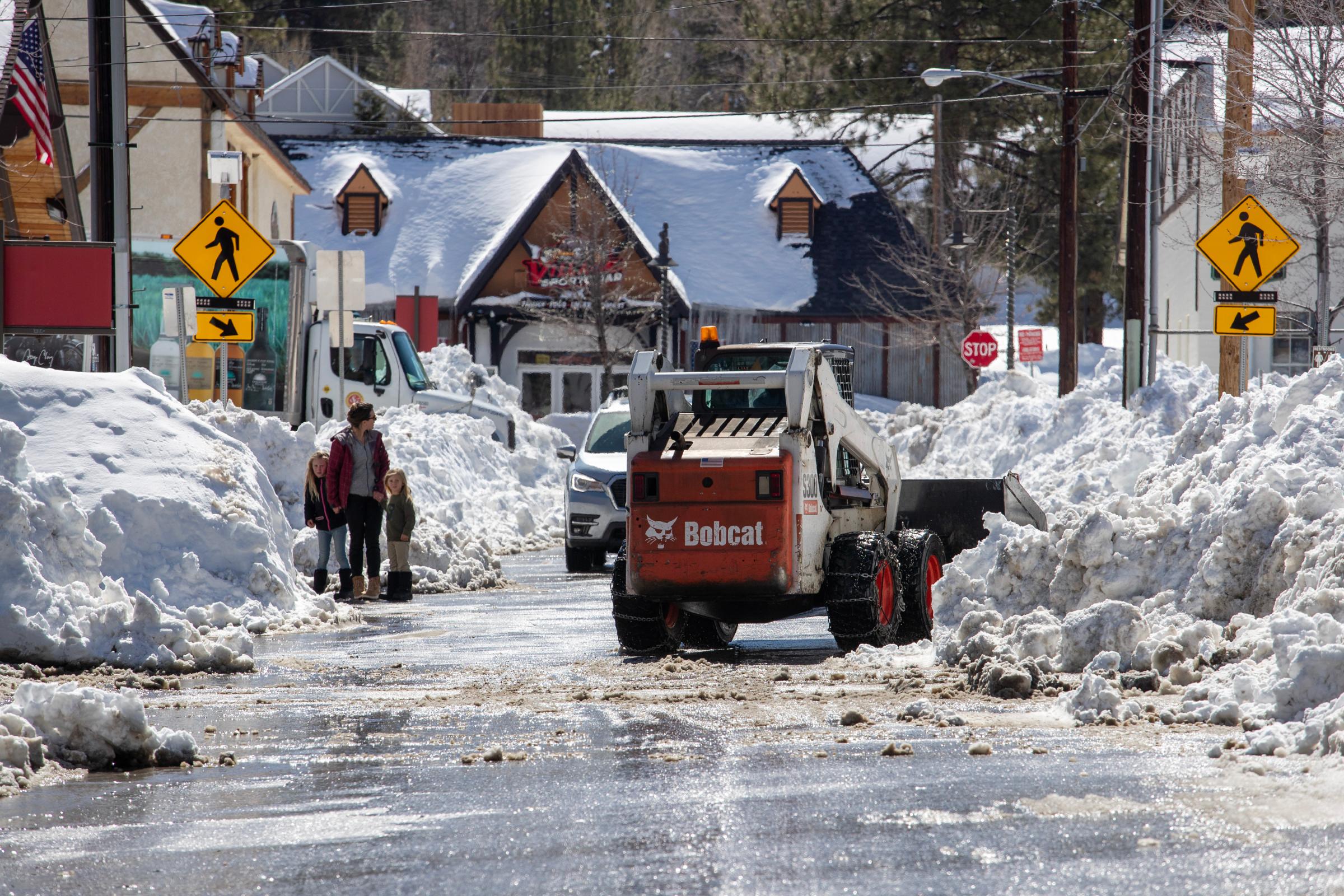
Thousands of residents of Southern California who have been stranded by up to 10 feet of snow since Feb. 28 could be stuck for another week, officials warned.
A remarkable blizzard tore through the San Bernardino Mountain region, east of Los Angeles, as much of Southern California experienced harsh arctic cold last week. With a population of more than 2 million, San Bernardino County is home to thousands of people living in isolated mountainous and forested areas, many of whom are seasonal visitors.
Across the region, rescuers are working around the clock to plow roads and open paths to buried homes and businesses. But, they are being overwhelmed by the magnitude of the storm, local authorities say. Highways leading up to the mountains have been mostly closed since the storm, opening intermittently for residents and to deliver supplies.
“There are snow plows everywhere and you are going to see direct relief coming to your doorsteps shortly,” San Bernardino County Sheriff Shannon Dicus told reporters on Friday.. “I’d love to give you exact times and dates to be able to do that, but it just isn’t possible at this point,” he said.
Response after the storm
California Governor Gavin Newsom declared states of emergency in 13 counties following the storm, which brought snowfall heavy enough to collapse rooftops and freezing temperatures that coated roads in black ice.
A grocery store in the mountain resort town of Crestline was eager to help the community with supplies, but on Wednesday, the building collapsed under the weight of several feet of snow.
San Bernardino County officials had previously estimated that it could take up to two weeks to rescue everyone, but the estimate has since grown shorter. “Because of the state’s efforts and the equipment that’s coming in behind us we’re hoping to drop that down to a week,” Dicus said.
Authorities only received warning about the severity of the storm about a day and a half in advance, officials said Friday, which was not enough time to prepare and get specialized equipment to plow and dig through the snow.
“We need better plans when it comes to severe blizzards. We need to have leases set up to allow us to get the equipment quicker. We need to have agreements set up to allow private contractors to come in,” San Bernardino County Fire Chief Dan Munsey said Friday.
“At the end of the day, we’re not going to be able to support the immense population that in some cases are just not prepared for this weather event,” he added.

What’s happening now?
About 80,000 people live in the city of Big Bear Lake, which sits at 6,700 feet of elevation, and smaller unincorporated mountain communities nearby. The area is popular for year-round recreation and is largely occupied by vacationing or seasonal visitors. Many of these people weren’t prepared for inclement weather, and have run out of food, water and other essentials, and some are no longer able to heat their homes, according to county officials, prompting authorities to take rescue efforts very seriously and respond rapidly.
In some locations, resident have been stuck even longer. Graham Smith and his husband, living in Blue Jay, were unable to leave their home for 10 days, and spent most of their time shoveling snow, trying to make sure their cars wouldn’t be buried, the Los Angeles Times reports. “Our backs are broken, everything aches,” Smith told the L.A. Times. “Whatever help is coming now should have been here days ago.”
The narrow windy roads through the mountains can be treacherous in the winter. Some people who tried to leave during the storm abandoned their cars on the impassable roads, adding a challenge for snow plows combing through the routes now, along with power lines and other debris brought down by the blizzard.
Rescuers are having greater success clearing roads and driveways with dump trucks and front-end loaders than traditional snow plowers, and according to the California Department of Transportation, crews have cleared almost two million cubic meters of snow from state highways so far.
Authorities closed access to the San Bernardino National Forest on Friday, until at least March 16, where response crews are working to plow the snowy roads.
Officials haven’t been able to estimate how many people are trapped yet, but they’re optimistic that the worst has passed. “The weather looks great for the next seven days, and that’s great news,” Munsey said.
More Must-Reads from TIME
- Caitlin Clark Is TIME's 2024 Athlete of the Year
- Where Trump 2.0 Will Differ From 1.0
- Is Intermittent Fasting Good or Bad for You?
- The 100 Must-Read Books of 2024
- Column: If Optimism Feels Ridiculous Now, Try Hope
- The Future of Climate Action Is Trade Policy
- FX’s Say Nothing Is the Must-Watch Political Thriller of 2024
- Merle Bombardieri Is Helping People Make the Baby Decision
Contact us at letters@time.com